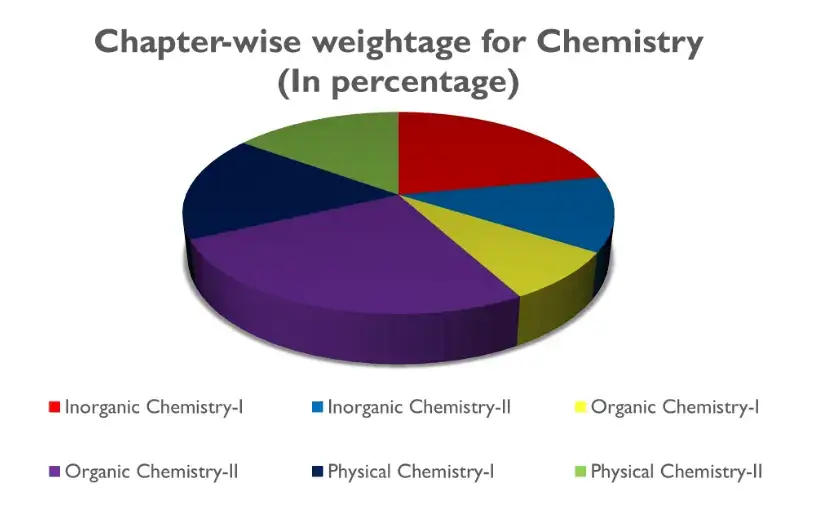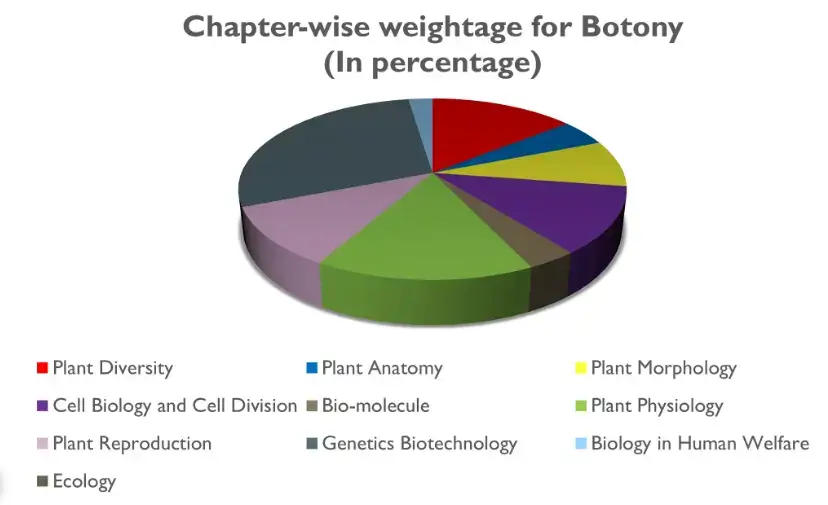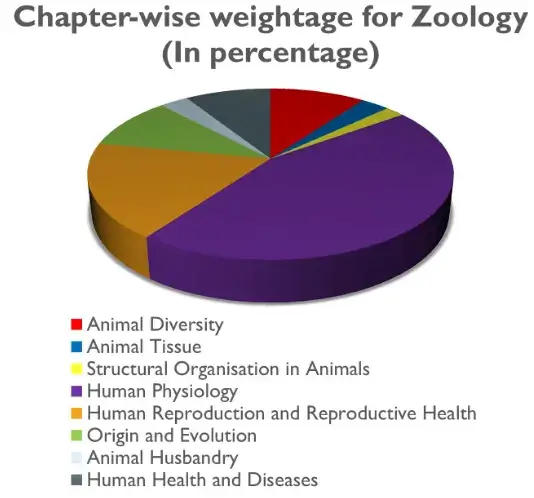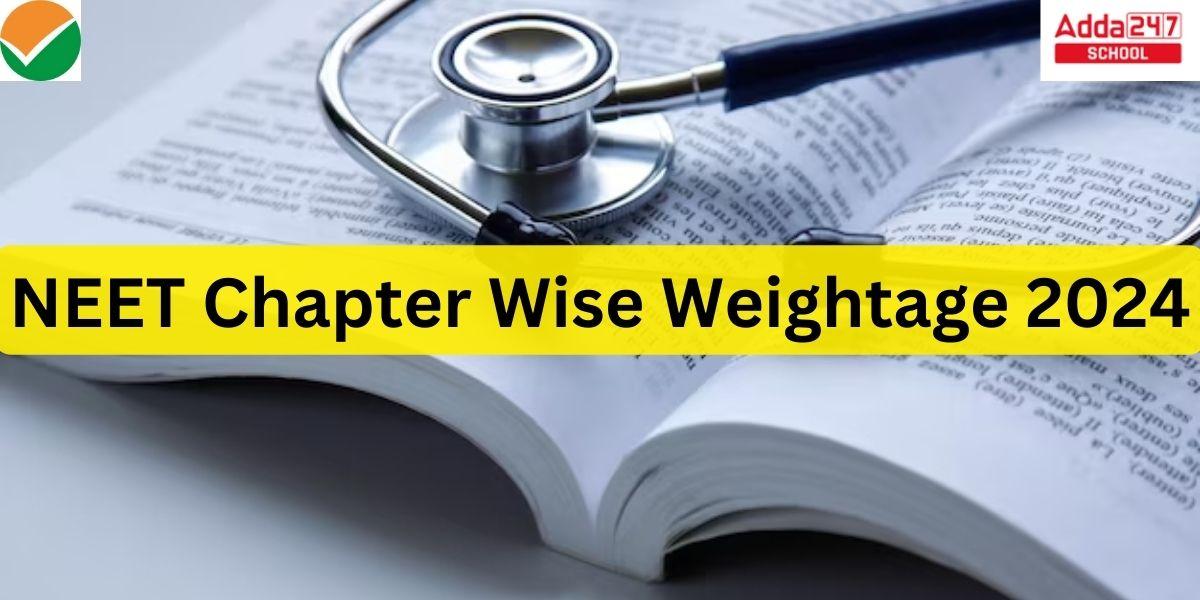The NEET syllabus 2024 has undergone several changes and that in turn changed the NEET Chapter Wise weightage 2024 for the NEET This year examination. The NEET Syllabus has been released by the NMC for the NEET 2024 exam. The NEET 2024 detailed notification along with the information bulletin has also been released by the NTA that contains the detailed NEET Chapter wise Weightage 2024 for the upcoming NEET exam. The NEET UG 2024 exam is scheduled for 5 May 2024.
NEET Chapter Wise Weightage 2024
Students who are going to take the NEET 2024 exam must make sure that they know the NEET 2024 chapter wise weightage to strategize their preparation for scoring excellent marks. The NEET Chapter wise weightage 2024 has changed due to revisions in the NEET 2024 syllabus. There are chapters that have been added to each of the three subjects, even while some have been eliminated from the others. As a result, the weightage of the NEET 2024 chapters will alter.
There is currently no way to calculate the weightage assigned to the recently added chapters. We have removed the topics and weightage that were deleted from the NEET 2024 syllabus for the convenience of the applicants. The NEET chapter-wise weightage pdf from NTA will assist candidates taking the medical entrance exams in determining and scheduling the amount of time to spend on each topic/subject based on its weightage for the exam.
Weightage of Chapters in NEET 2024 PDF Download
The NEET (UG) 2024 exam is approaching closer and the NTA has started the NEET UG registration process 2024 from 9 February onwards. So, students who are preparing for the NEET exam must go through the chapter-wise weightage as per the latest syllabus released by the NTA. The weightage of chapters in neet 2024 pdf download link is also given below in this article, and The chapter-wise weightage for all the three subjects of the NEET exam: Physics, Chemistry, and Biology (Botany & Zoology) is based on the revised NTA NEET syllabus 2024 is Seperately disccused below. Check out the weightage of chapters in NEET 2024 exam for all subjects here.
NEET Physics Chapter Wise Weightage 2024
Laws of Motion, System of Particle and Rigid Body, Thermodynamics, Magnetic Effect of Current & Magnetism, Current Electricity, etc. are the most crucial chapters for the NEET Physics section. More time on these chapters is advised by experts. In addition to studying from NCERT and other reference materials, a candidate should concentrate on answering problems involving numbers in order to get good grades in Physics. The NEET Reduced Syllabus 2024 physics chapter-wise weightage for all units of the Class 11 and 12 syllabus is given below in the following table.
| NEET 2024 Physics Chapter wise Weightage | |||
| Class 11 – NEET Physics Syllabus 2024 Chapter-wise Weightage | Class 12 – NEET Physics Syllabus 2024 Chapter-wise Weightage | ||
| Chapters | Weightage | Chapters | Weightage |
| Physical-world and measurement | 2% | Electrostatics | 9% |
| Chapter–1: Physical World | Chapter-1: Electric Charges and Fields | ||
| Chapter–2: Units and Measurements | Chapter-2: Electrostatic Potential and Capacitance | ||
| Kinematics | 3% | Current Electricity | 8% |
| Chapter–3: Motion in a Straight Line | Chapter-3: Current Electricity | ||
| Chapter–4: Motion in a Plane | Magnetic Effect of Current & Magnetism | 5% | |
| Laws of Motion | 3% | Chapter-4: Moving Charges and Magnetism | |
| Chapter–5: Laws of Motion | Chapter-5: Magnetism and Matter | ||
| Work, Energy and Power | 4% | Electromagnetic Induction & Alternating Current | 8% |
| Chapter–6: Work, Energy and Power | Chapter-6: Electromagnetic Induction | ||
| Motion of System of Particles and Rigid Body | 5% | Chapter-7: Alternating Current | |
| Chapter–7: System of Particles and Rotational Motion | Electromagnetic Waves | 5% | |
| Gravitation | 2% | Chapter-8: Electromagnetic Waves | |
| Chapter–8: Gravitation | Optics | 10% | |
| Properties of Bulk Matter | 3% | Chapter-9: Ray Optics and Optical Instruments | |
| Chapter–9: Mechanical Properties of Solids | Chapter-10: Wave Optics | ||
| Chapter–10: Mechanical Properties of Fluids | Dual Nature of Matter and Radiation | 6% | |
| Chapter–11: Thermal Properties of Matter | Chapter-11: Dual Nature of Radiation and Matter | ||
| Thermodynamics | 9% | Atoms & Nuclei | 3% |
| Chapter–12: Thermodynamics | Chapter-12: Atoms | ||
| Behaviour of Perfect Gas and Kinetic Theory | 3% | Chapter-13: Nuclei | |
| Chapter–13: Kinetic Theory | Electronic Devices | 9% | |
| Oscillation & Waves | 3% | Chapter-14: Semiconductor Electronics | |
| Chapter–14: Oscillations | |||
| Chapter–15: Waves | |||
NEET Chemistry Chapter Wise Weightage 2024
The NEET Chemistry section consists topics from Physical, Inorganic, and Organic chemistry. The NEET Syllabus 2024 chemistry chapter-wise weightage for all units of the Class 11 and 12 syllabus is given below in the following table.
| NEET Chemistry Chapter wise Weightage 2024 | |||
| Class 11 – NEET Chemistry Syllabus 2024 Chapter- wise Weightage | Class 12 – NEET Chemistry Syllabus 2024 Chapter-wise Weightage | ||
| Chapters | Weightage | Chapters | Weightage |
| Basic Concepts of Chemistry | 1% | Solid State | 2% |
| Structure of Atom | 2% | Solutions | 5% |
| Classification of Elements & Periodicity in Properties | 2% | Electrochemistry | 2% |
| Chemical Bonding and Molecular Structure | 5% | Chemical Kinetics | 3% |
| States of Matter: Gases and Liquids | 2% | Surface Chemistry | 2% |
| Thermodynamics | 8% | Isolation of Elements | 2% |
| Equilibrium | 6% | p-Block Elements | 5% |
| Redox Reactions | 3% | d- and f-Block Elements | 4% |
| Hydrogen | Coordination Compounds | 9% | |
| s-Block Elements | 2% | Haloalkanes and Haloarenes | 3% |
| Some p-Block Elements | 2% | Alcohols, Phenols and Ethers | 4% |
| Organic Chemistry: Basic Principles & Techniques | 4% | Aldehydes, Ketones and Carboxylic Acids | 4% |
| Hydrocarbons | 3% | Organic Compounds containing Nitrogen | 2% |
| Environmental Chemistry | 2% | Biomolecules | 3% |
| Chemistry in Everyday Life | 2% | Polymers | 3% |
NEET Biology Chapter Wise Weightage 2024
The biology section is very important for the NEET exam as half of the total questions are asked from this section. The chapter wise weightage for NEET 2024 Biology syllabus pdf from NTA will assist applicants in determining and planning the time to be given to a topic/subject based on its weightage for the NEET exam. The tables below show the NEET 2024 Biology chapter weightage and units in the class 11 and 12 syllabus. This analysis is based on previous years’ trends.
| NEET 2024 Biology Chapter wise Weightage | ||
| Class XI | ||
| Unit | Topic / Chapters | Weightage |
| I | Diversity of Living Organisms |
14%
|
| Chapter-1: The Living World | ||
| Chapter-2: Biological Classification | ||
| Chapter-3: Plant Kingdom | ||
| Chapter-4: Animal Kingdom | ||
| II | Structural Organisation in Plants & Animals |
5%
|
| Chapter-5: Morphology of Flowering Plants | ||
| Chapter-6: Anatomy of Flowering Plants | ||
| Chapter-7: Structural Organisation in Animals | ||
| III | Cell: Structure and Function |
9%
|
| Chapter-8: Cell-The Unit of Life | ||
| Chapter-9: Biomolecules | ||
| Chapter-10: Cell Cycle and Cell Division | ||
| IV | Plant Physiology |
6%
|
| Chapter-11: Transport in Plants | ||
| Chapter-12: Mineral Nutrition | ||
| Chapter-13: Photosynthesis in Higher Plants | ||
| Chapter-14: Respiration in Plants | ||
| Chapter-15: Plant – Growth and Development | ||
| V | Human Physiology |
20%
|
| Chapter-16: Digestion and Absorption | ||
| Chapter-17: Breathing and Exchange of Gases | ||
| Chapter-18: Body Fluids and Circulation | ||
| Chapter-19: Excretory Products and Their Elimination | ||
| Chapter-20: Locomotion and Movement | ||
| Chapter-21: Neural Control and Coordination | ||
| Chapter-22: Chemical Coordination and Integration | ||
| NEET Biology Chapter wise Weightage 2024 | ||
| Class XII | ||
| Unit | Topic / Chapters | Weightage |
| VI | Reproduction |
9%
|
| Chapter 1: Reproduction in Organisms | ||
| Chapter 2: Sexual Reproduction in Flowering Plants | ||
| Chapter 3: Human Reproduction | ||
| Chapter 4: Reproductive Health | ||
| VII | Genetics and Evolution |
18%
|
| Chapter 5: Principles of Inheritance and Variation | ||
| Chapter 6: Molecular Basis of Inheritance | ||
| Chapter 7: Evolution | ||
| VIII | Biology and Human Welfare |
9%
|
| Chapter 8: Human Health and Diseases | ||
| Chapter 9: Strategies for Enhancement in Food Production | ||
| Chapter 10: Microbes in Human Welfare | ||
| IX | Biotechnology and its Applications |
4%
|
| Chapter 11: Biotechnology – Principles and Processes | ||
| Chapter 12: Biotechnology and its Application | ||
| X | Ecology and Environment |
6%
|
| Chapter 13: Organisms and Populations | ||
| Chapter 14: Ecosystem | ||
| Chapter 15: Biodiversity and Its Conservation | ||
| Chapter 16: Environmental Issues | ||
| Total | 100% | |
NEET Chapter Wise Weightage: Physics Important Topic
Here is a list of a few basic physics chapters that were commonly asked and can be noted as essential when studying, based on an analysis of the NEET 2023 examination paper’s physics section. To improve your score, revise these NEET 2024 physics important topics at least three times.
| NEET Chapter wise Weightage Physics Important Topics |
| Optics |
| Work, Energy, and Power |
| Modern Physics |
| Rotational Motion |
| Heat and Thermodynamics |
| Laws of Motion |
| Magnetism and Current Electricity |
| Kinematics |
| Electrostatics and Semiconductors |
| Ohm’s Law |
| Speed |
| Mirrors |
| Electromagnetic waves and Electromagnetic induction |
| Types of Lens and Reflection of Light |
| Angular Momentum |
| Poisson’s Ratio |
| Units of Force and Conversion of Units |
| Velocity and Waves |
NEET Chapter Wise Weightage: Chemistry Important Topics
Biology, Chemistry, and Physics, as well as each of its chapters, are all equally important for the upcoming NEET 2024 examination. After evaluating the NEET examination paper chemistry section, below is a list of a few essential chemistry chapters that were commonly asked. Revise this NEET chemistry syllabus 2024 important topics as much as possible to better understand the concepts.
- Electrochemistry
- Chemical Kinetics
- Equilibrium
- Hydrocarbons
- S, P, D, and F-Block Elements
- Molecular Structure and Chemical bonding
- Atomic Structures
- Aldehydes, Ketones, and Carboxylic Acids
- Coordination Compounds
- Hybridization
- Electron Configuration
- Charles S Law
- Aufbau Principle
- Mole Concept
- Atomic numbers along with symbols and 118 Elements
- Periodic Classification of Elements
- Hund’s Rule
- Oxidation and Reduction
NEET Chapter Wise Weightage: Biology Important Topics
However, based on an analysis of the NEET 2023 question paper, below is a list of several fundamental biology chapters that were frequently asked and can be recognized as significant while preparing. After finishing the entire NEET 2024 biology syllabus, review the following important topics to skyrocket your score.
| NEET Chapter wise Weightage Biology Important Topics |
|
Human Physiology
|
|
Plant Physiology
|
| Ecology |
| Genetics |
| Evolution |
|
Cell Structure and their Function
|
|
Biotechnology
|
| Plants |
| Biodiversity |
|
Photosynthesis
|
| Human Heart |
|
Respiration and Alimentary Canal
|
|
Human Digestive System
|
|
Cell Prokaryotic Cell and Eukaryotic Cell
|
| Algae |
| Taxonomy |
NEET 2024 Chemistry Weightage: Number of Questions Per Chapter
In NEET 2023, Inorganic Chemistry received the most questions, followed by Physical Chemistry and Organic Chemistry. Candidates preparing for the NEET chemistry part should examine the topic-wise question arrangement from all chapters, as shown in the table below. This assists in gaining a better understanding of the topics that must be given more priority and can result in satisfactory outcomes in the examination.

| NEET Chemistry Question Distribution 2024 – Class 11 | ||
| Unit | Chapters |
Number of Questions
|
| I | Basic Concepts in Chemistry | 2 |
| II | Atomic Structure | 2 |
| III | Elements’ classification and periodicity in properties | 1 |
| IV | Bonding between chemicals and molecular structure | 2 |
| V | Liquids and gases are states of matter | 2 |
| VI | Thermodynamics | 1 |
| VII | Equilibrium | 2 |
| VIII | Redox Reactions | 1 |
| IX | Hydrogen | – |
| X | s-Block Element | 2 |
| XI | Several p-Block Elements | 2 |
| XII | Organic Chemistry: Basic Concepts and Methods | 4 |
| XIII | Hydrocarbons | 3 |
| XIV | The Chemistry of the Environment | 1 |
| NEET Chemistry Question Distribution 2024 – Class 12 | ||
| Unit | Topic / Chapters |
Number of Questions
|
| I | Solid State | 2 |
| II | Solutions & Colligative Properties | 2 |
| III | Electrochemistry | 3 |
| IV | Chemical Kinetics | 2 |
| V | Surface Chemistry | 1 |
| VI | General Principles and Processes of Isolation of Elements | 1 |
| VII | p-Block Elements | 2 |
| VIII | Elements of the d- and f-Blocks | 1 |
| IX | Coordination Compounds | 2 |
| X | Haloalkanes and Haloarenes | 1 |
| XI | Phenols, alcohols, and ethers | 2 |
| XII | Carboxylic Acids, Ketones, and Aldehydes | 3 |
| XIII | Organic Compounds containing Nitrogen | 2 |
| XIV | Biomolecules | 1 |
| XV | Polymers | 1 |
| XVI | Chemistry in everyday life | 1 |
Chapter Wise Question Weightage in NEET 2024 Biology
The number of questions that can be asked from each of the chapters in the NEET Biology syllabus is given below for the NEET 2024 exam. The NEET UG exam is worth 720 marks, with the Biology section alone worth 360 points. In other words, the Biology section of the NEET contains 90 questions, while the Botany and Zoology sections each contain 45.
The questions asked in the Biology section of NTA NEET are generally straightforward and concept-based, allowing well-prepared students to score higher marks. Therefore, a solid grasp of Biology can help student boost their overall score. We examined NEET question papers and chapter-by-chapter weightage for NEET 2024. The questions numbers asked in past years’ NEET exams are chapter wise discussed in detail.
| NEET Biology 2024 Chapter wise Questions | |
| Chapter |
No. of Questions
|
| The Living World | 1 |
| Biological Classification | 1 |
| Plant Kingdom | 5 |
| Animal Kingdom | 4 |
| Morphology of Flowering Plants | 2 |
| Anatomy of Flowering Plants | 3 |
| Structural Organisation in Animals | 3 |
| Digestion and Absorption | 2 |
| Breathing and Exchange of Gases | 3 |
| Body Fluids and Circulation | 3 |
| Transport in Plants | 1 |
| Photosynthesis in Higher Plants | 4 |
| Respiration in Plants | 1 |
| Plant Growth and Development | 3 |
| Cell: The Unit of Life | 2 |
| Biomolecules | 3 |
| Cell Cycle and Cell Division | 7 |
| Locomotion and Movement | 4 |
| Sexual Reproduction in Flowering plants | 3 |
| Human Reproduction | 3 |
| Reproductive Health | 3 |
| Principles of Inheritance and Variation | 2 |
| Molecular Basis of Inheritance | 10 |
| Evolution | 1 |
| Human Health and Disease | 3 |
| Strategies for Enhancement in Food Production | 3 |
| Microbes in Human Welfare | 1 |
| Biotechnology: Principles and Processes | 6 |
| Biotechnology and its Applications | 5 |
| Organisms and Populations | 4 |
| Ecosystem | 3 |
| Environmental Issues | 1 |
NEET Biology Chapter wise Weightage 2024 for Botany
As we know that the NEET Biology section is divided into Botany and Zoology, one must prepare for both the parts thoroughly. Below the table shows NEET chapter-wise weightage for Biology – botany Part. This analysis is based on previous years’ trends.

| NEET Biology Chapter-wise Weightage 2024 – Botany | ||
|
Biology Topics
|
Weightage of the Chapter (In percentage) |
The average No. of Questions came in the exam
|
| Plant Diversity | 12% | 7 |
| Plant Anatomy | 4% | 2 |
| Morphology of Flowering Plants | 7% | 4 |
| Cell Structure & Function | 10% | 6 |
| Bio-molecule | 3% | 2 |
| Plant Physiology | 13% | 8 |
| Plant Reproduction | 9% | 5 |
| Genetics and Evolution | 24% | 15 |
| Ecology and Environment | 16% | 10 |
| Total | 100% | |
NEET 2024 Biology Chapter-wise Weightage for Zoology
Candidates must, however, allocate their time wisely among the many chapters asked in zoology. Candidates should strive to revise the most relevant topics for NEET 2024 on a regular basis. This will assist them in remaining equipped for the examination, whenever it is held. students can organize their studies appropriately including multiple revisions. Here NEET Biology chapter wise weightage 2024 for zoology topics are discussed below.

| NEET 2024 Biology Chapter-wise Weightage – Zoology | ||
|
Biology topics
|
Weightage of the Topic (In percentage) |
Average No. of Questions from the Chapter
|
| Animal Kingdom | 10% | 3 |
| Structural Organization in Animals | 5% | 2 |
| Human Physiology | 45% | 13 |
| Human Reproduction & Reproductive Health | 18% | 5 |
| Origin & Evolution | 10% | 3 |
| Animal husbandry | 3% | 1 |
| Biology and Human Welfare | 2% | 1 |
| Human Health & Diseases | 9% | 3 |
| Total | 100% | |
Chapter wise Weightage for NEET 2024 PDF by NTA
The NTA has formally released the latest chapter wise syllabus PDF for the NEET 2024 on its official website. The chapter wise weightage for neet 2024 pdf by nta is primarily divided into three sections: biology, chemistry, and physics. Both botany and chemistry are included in the biology topics, and chapter-wise weighting will be explained for each component. This NEET 2024 chapter-by-chapter weighting aids and counsels students in effectively preparing for the entrance exam. The PDF released by the NTA on behalf of the NMC is given below.















 NEET Cutoff 2025 Out: Check General, OBC...
NEET Cutoff 2025 Out: Check General, OBC...
 NEET State Wise Cut Off 2025 (Updated), ...
NEET State Wise Cut Off 2025 (Updated), ...
 Documents Required for NEET Counselling ...
Documents Required for NEET Counselling ...


